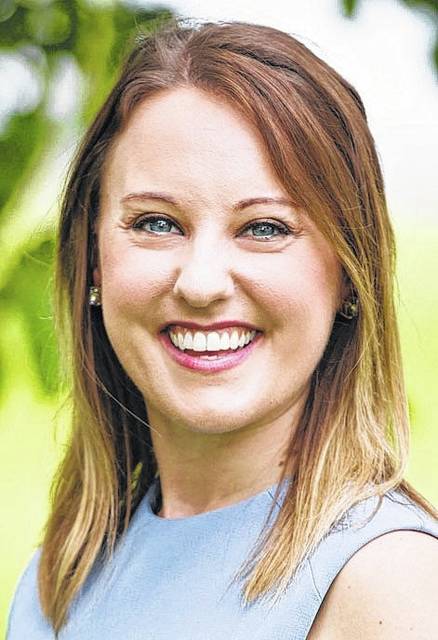

WAPAKONETA — A new face will occupy the 84th Ohio House of Representative seat after the Nov. 6 General Election.
Democrat Joseph Monbeck, of Wapakoneta, and Republican Susan Manchester, of Lakeview, are seeking the seat vacated by Republican Keith Faber, of Celina, who is running for state auditor. The 84th House District includes northern Darke, most of Shelby and Auglaize and all of Mercer counties.
Monbeck is a graduate of Celina High School and the International College of Broadcasting. He and his partner of six years, Levi, reside in Wapakoneta. Monbeck is the secretary of the Auglaize County Democratic Executive Committee and chairman of the Auglaize County Democratic Central Committee. He is an advertising representative for small business in Bellefontaine.
Manchester, who is single, is a graduate of the Ohio State University with a Bachelor of Arts in Political Science and Bachelor of Arts in Psychology. She has a M.P.S. in Political Management from the George Washington University. She was a legislative assistant for U.S. Rep. Jim Jordan, R-Urbana, 4th District, and a field organizer for the Ohio Republican Party. She is the community outreach director for Big Brothers Big Sisters of West Central Ohio.
Manchester defeated Travis Faber and Aaron Heilers in the May primary to be the Republican Party’s candidate in the November election.
What do you consider your three most important accomplishments?
MONBECK: First person in my family to graduate from college.
I was very fortunate to help educate west central Ohio on the implementation of the Affordable Care Act, and was proud to see the number of insured Americans to the highest level ever.
MANCHESTER: Working with Congressman Jim Jordan in Washington, D.C. provided me with many opportunities to work on issues that Ohioans care about most. I helped run one of the lowest spending offices in the country, drafted work requirement legislation for able-bodied individuals receiving federal government assistance, and advanced a bill protecting life at conception. Coming back to Ohio and seeing the impact of these issues gives me greater energy to continue working on them at the state level.
What do you consider your three most important goals?
MANCHESTER: My top priority as state representative will be to protect our hard-earned tax dollars and use them wisely. I learned this first-hand by helping run one of the lowest-spending congressional offices in the country with Congressman Jim Jordan. Despite low unemployment, our state budget keeps increasing, and I want to find areas to cut spending in Ohio’s budget.
We can also help remove the barriers to job creation in Ohio. My background in agriculture and small business have prepared me to fight for smarter, common sense policies in areas like health care, education and welfare reform. I’m one who believes we don’t always have to throw more taxpayer money at the problems facing our state.
Finally, I will fight to protect our core conservative values by voting 100% Pro-Life and 100% Pro-Second Amendment at the statehouse.
MONBECK: My most important goal as your representative is to shift priorities of state government from representing lobbyists, special interests and campaign donors and start representing those that elected us into office. I will protect Ohio’s Medicaid expansion that has been very detrimental in helping local communities fight the opioid epidemic and help Ohioans get back to work. Ohio’s Medicaid expansion has also been very helpful to many of Ohio’s small businesses that are unable to provide employees with healthcare coverage. I will also help strengthen Ohio’s education system to help prepare Ohio’s workforce for the many available jobs.
State Issue 1 on the Nov. 6 ballot would “Reduce Penalties for Crimes of Obtaining, Possessing, and Using Illegal Drugs.” Should this issue pass or fail, and why?
MONBECK: Although I do support the idea that addicts need to be treated in our healthcare system rather than the courts, Issue one ties the hands of future legislatures to work out the kinks that is inherent to any new legislation. For this reason, I will be voting no for issue 1.
MANCHESTER: I am opposed to Issue 1. Law enforcement, judges, and prosecutors agree that this is not the way to curb drug-related crimes in our state. It would undercut the effectiveness of drug courts and rehabilitation programs by allowing drug traffickers to get by with a misdemeanor charge rather than receiving long-term, life-changing help. Additionally, making these changes to Ohio’s constitution would tie the hands of the legislature in combating the opioid epidemic, hurting our ability to seek effective, long-term solutions based on input from the ground level.
How can you help the district overcome the tariffs being implemented against the United States by various countries?
MANCHESTER: I’ve met with employers across the district who are concerned about the long and short term effects of these tariffs. Right now our national, state, and local economies are strong, and I want to ensure that we continue on that trend. Removing barriers to job creation in Ohio, keeping taxes low, and reducing state spending are all steps in the right direction toward maintaining and growing a strong economy in the midst of potential challenges.
MONBECK: Unfortunately, most of the control of this is at the federal level. As your elected leader, I will work closely with the local elected U.S. congress people to guarantee Ohio stays competitive globally.
After the recent drug overdoses at the Chillicothe prison, how do we protect law enforcement exposed to illegal drugs as they do their job protecting citizens?
MONBECK: We must make sure that Ohio’s law enforcement has the tools that they need. Unfortunately, the one party rule in Columbus over the past three decades have slashed funds for local government resources to give tax breaks to Ohio’s wealthiest families. My top priority will be to restore funding to local governments, schools and police to pre recession austerity measures.
MANCHESTER: Safety for law enforcement is a top priority. After meeting with folks on every side of the drug issue, from local law enforcement, to recovery agencies, to addicts and their families, I do not believe the state needs to create another government program to combat opiate addiction. Rather, the state should support law enforcement and empower churches, non-profits and agencies at the local level who are already doing a good job. This support must encourage a “tough love” component that is necessary for anyone to break an addiction. It also includes allowing local rehabilitation units the flexibility to determine which methods are most effective for helping addicts recover and return to productive society. The effects of the opioid crisis are far-reaching even in small rural communities like ours, and it’s going to take an all-of-the-above approach from law enforcement, families, the faith community, and recovery agencies to ensure that we are addressing the issue properly.
How can local employers find quality workers for their growing businesses and industries?
MANCHESTER: Ohio has what it takes to be a great destination for quality workers, both from inside and outside the state. We need to keep Ohio competitive with other states by creating a business-friendly environment that encourages growth and reduces barriers to entry. Even with low unemployment rates in our area, there are a lot of unfilled jobs, both entry-level and above. Employers are struggling to find people to fill these open positions. This is in part due to the drug issue, but it is also affected by the generous government benefit packages able-bodied individuals can receive. We should enforce work requirements from the state-level to all counties, and also find ways to eliminate the barriers that keep people trapped in the system. One example of this would be phasing out benefits as individuals climb the ladder to self-sufficiency, instead of abruptly cutting all benefits once someone reaches a certain income level. I helped draft work requirement legislation for able-bodied individuals at the federal level, and I would fight for the same as your state representative.
MONBECK: We must do a better job investing in education, not only k-12 but vocational schools, and post secondary. We our very fortunate in our area to have such low unemployment, but there is a huge skills gap. History and evidence shows us that the best way to get qualified, efficient employees is to invest in healthcare and education.



